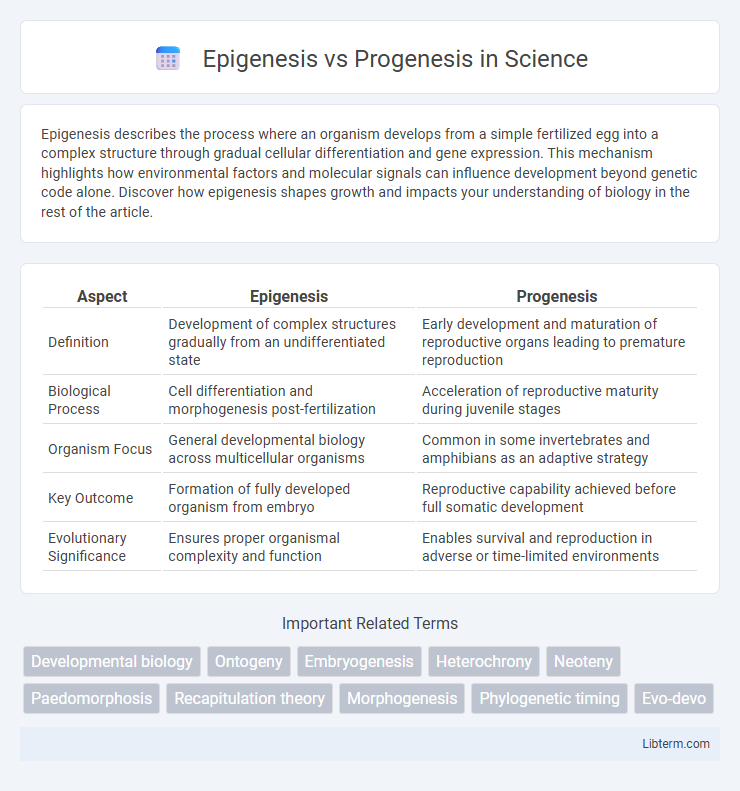Epigenesis describes the process where an organism develops from a simple fertilized egg into a complex structure through gradual cellular differentiation and gene expression. This mechanism highlights how environmental factors and molecular signals can influence development beyond genetic code alone. Discover how epigenesis shapes growth and impacts your understanding of biology in the rest of the article.
Table of Comparison
| Aspect | Epigenesis | Progenesis |
|---|---|---|
| Definition | Development of complex structures gradually from an undifferentiated state | Early development and maturation of reproductive organs leading to premature reproduction |
| Biological Process | Cell differentiation and morphogenesis post-fertilization | Acceleration of reproductive maturity during juvenile stages |
| Organism Focus | General developmental biology across multicellular organisms | Common in some invertebrates and amphibians as an adaptive strategy |
| Key Outcome | Formation of fully developed organism from embryo | Reproductive capability achieved before full somatic development |
| Evolutionary Significance | Ensures proper organismal complexity and function | Enables survival and reproduction in adverse or time-limited environments |
Introduction to Epigenesis and Progenesis
Epigenesis is a biological process where an organism develops progressively from an undifferentiated state through cellular differentiation and morphogenesis, contrasting with progenesis, which involves accelerated development leading to reproductive maturity at an earlier, often juvenile, stage. This distinction plays a crucial role in developmental biology, influencing evolutionary strategies and life cycle adaptations. Understanding the mechanisms of epigenesis and progenesis enhances insights into developmental timing and phenotype expression across species.
Defining Epigenesis: Concepts and Mechanisms
Epigenesis refers to the developmental process where an organism's structure emerges progressively from an initially undifferentiated state through cellular differentiation and gene expression regulation. This concept contrasts with predetermined development, emphasizing mechanisms such as DNA methylation, histone modification, and non-coding RNA involvement that modify phenotypic outcomes without altering the underlying genetic code. Epigenetic mechanisms play a critical role in shaping phenotypic plasticity and organismal complexity during growth and development.
Understanding Progenesis: Key Features and Principles
Progenesis involves the acceleration of sexual maturity relative to somatic development, resulting in an organism reaching reproductive capability at an earlier developmental stage. This heterochronic process contrasts with epigenesis by emphasizing timing shifts within developmental pathways rather than the gradual emergence of form from undifferentiated cells. Key principles of progenesis include altered gene expression regulation that truncates growth phases and prioritizes reproductive organ maturation, influencing evolutionary strategies and developmental biology models.
Historical Perspectives: Evolution of Developmental Theories
Epigenesis and progenesis represent contrasting historical developmental theories that shaped early biological understanding; epigenesis posits that organisms develop progressively from an undifferentiated state, while progenesis suggests accelerated maturation occurs at an early stage. The evolution of these theories influenced key figures such as Aristotle, who supported epigenesis, and 17th-century preformationists who aligned more with progenesis concepts, reflecting shifts in embryological thought. Advances in microscopy and embryology during the 18th and 19th centuries further refined these perspectives, leading to modern developmental biology's synthesis of genetic and epigenetic mechanisms.
Molecular Basis of Epigenesis versus Progenesis
Epigenesis involves molecular mechanisms such as DNA methylation, histone modification, and non-coding RNA regulation that alter gene expression without changing the DNA sequence, leading to gradual phenotypic development. Progenesis primarily affects molecular pathways by accelerating developmental timing, often through early activation of growth factor signaling or transcriptional regulators, resulting in premature reproductive maturity. The key distinction lies in epigenesis modifying gene expression patterns epigenetically, whereas progenesis modifies the temporal dynamics of molecular developmental programs.
Roles in Evolutionary Developmental Biology
Epigenesis involves the progressive differentiation of an organism's form from an initially undifferentiated state, playing a critical role in evolutionary developmental biology by enabling phenotypic plasticity and complex body plans to emerge. Progenesis accelerates reproductive maturity while truncating somatic development, influencing evolutionary trajectories by promoting paedomorphosis and altering life history strategies. Together, these processes shape developmental timing and morphological innovation, driving evolutionary diversification across species.
Comparative Examples Across Species
Epigenesis involves the gradual development of an organism's form and structure from an initially undifferentiated state, as seen in amphibian embryos like frogs undergoing complex tissue differentiation. Progenesis, by contrast, is characterized by the acceleration of reproductive maturity, exemplified in certain insect species such as some parasitic wasps that reach sexual maturity faster while retaining juvenile features. Comparative studies highlight how epigenesis drives extensive morphological changes over time, whereas progenesis results in evolutionary adaptations favoring earlier reproduction within shorter life cycles.
Implications for Human Development and Medicine
Epigenesis involves the gradual development of an organism through the activation of genetic potentials and environmental interactions, crucial for understanding developmental plasticity and disease susceptibility in humans. Progenesis refers to the acceleration of reproductive maturity, impacting growth patterns and potentially leading to early onset of age-related diseases. Insights into epigenesis and progenesis guide personalized medicine approaches by informing interventions targeting developmental timing and gene-environment dynamics.
Controversies and Debates in Modern Research
Epigenesis and progenesis spark ongoing controversy in developmental biology, centering on whether organismal features arise solely from genetic information or through dynamic interactions with environmental factors. Researchers debate if epigenetic modifications can override progenetic genetic programming during critical developmental windows, influencing phenotypic plasticity and evolutionary adaptation. Modern studies emphasize the complexity of gene-environment interplay, challenging simplistic dichotomies and highlighting the need for integrated models in developmental and evolutionary research.
Future Directions in Epigenesis and Progenesis Studies
Future research in epigenesis and progenesis studies is expected to leverage advanced genomic and epigenomic technologies to unravel complex gene-environment interactions driving developmental timing. Integration of single-cell sequencing and CRISPR-based epigenetic editing offers promising avenues for precise manipulation of epigenetic marks affecting progenetic traits. These approaches could illuminate novel regulatory mechanisms and therapeutic targets, enhancing our understanding of developmental plasticity and aging processes.
Epigenesis Infographic

 libterm.com
libterm.com